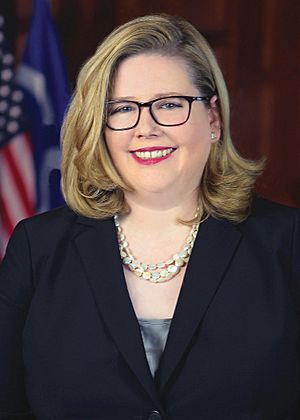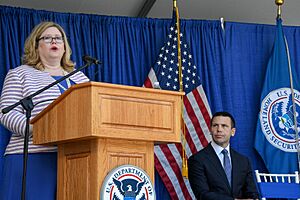Emily W. Murphy facts for kids
Quick facts for kids
Emily W. Murphy
|
|
|---|---|
 |
|
| Administrator of General Services | |
| In office December 12, 2017 – January 15, 2021 |
|
| President | Donald Trump |
| Deputy | Allison Brigati |
| Preceded by | Denise Turner Roth |
| Succeeded by | Robin Carnahan |
| Personal details | |
| Born |
Emily Webster Murphy
1973 (age 52–53) St. Louis, Missouri, U.S. |
| Political party | Republican |
| Education | Smith College (BA) University of Virginia (JD) |
Emily Webster Murphy (born 1973) is an American lawyer and former government leader. She was the head of the General Services Administration (GSA) from 2017 to 2021. Before leading the GSA, Murphy worked as a lawyer for the Republican National Committee. She also helped several government groups with rules for buying things for the government.
President Donald Trump chose her to lead the GSA in 2017. After the 2020 presidential election, she was in the news. This was because she waited to start the changeover to the Biden administration. Joe Biden won the election on November 7, 2020.
Murphy first did not sign a letter that would let Biden's team get federal help and money for the changeover. This happened while Trump did not agree that Biden had won. She finally signed the letter on November 23, 2020. This allowed the process for the new president to begin. Because of this delay, a law called the Electoral Count Act was changed. This change makes sure the GSA administrator cannot delay access to funds and resources in the future.
Contents
Early Life and Education
Emily Murphy was born in 1973 in St. Louis, Missouri. She grew up there with her brother and sister. Her father, James J. Murphy Jr., led a company that worked on mechanical and engineering projects. Her mother, Mimi Murphy, was also a lawyer.
Murphy went to Villa Duchesne and Oak Hill School and finished in 1991. She then earned a college degree from Smith College in 1995. Later, she studied law at the University of Virginia School of Law, getting her law degree in 2001.
Early Career in Government
After college, Murphy moved to Washington, D.C.. She started her career at the Republican National Committee (RNC) in 1995. She worked there until 1997. Then, she worked for Jim Talent, a Republican in the House of Representatives. She helped him with the House Committee on Small Business.
Murphy also worked as a lawyer for the United States House Committee on Armed Services. Here, she focused on how the government buys things. She also worked at the Small Business Administration. From 2005 to 2007, she was the Chief Acquisition Officer at the GSA. During this time, she reported an incident where the GSA administrator, Lurita Doan, asked how the GSA could help political candidates. This was against a rule called the Hatch Act of 1939. President George W. Bush then asked Doan to leave her job.
Murphy also worked for three different leaders of the United States House Committee on Small Business. She also spent five years working for a technology company that did business with the government. Plus, she worked as a government contracts lawyer at two law firms in D.C.
Leading the General Services Administration

In 2017, after President Trump took office, Emily Murphy became a senior advisor at the GSA. On September 2, 2017, President Trump nominated her to be the head of the GSA. The Senate approved her appointment on December 5, 2017. She took over from Denise Turner Roth.
In 2018, Murphy was involved in a discussion about the Federal Bureau of Investigation (FBI) headquarters. There were plans to move the FBI headquarters outside of Washington, D.C. and sell the land where the J. Edgar Hoover Building stands. Instead, a more expensive plan to rebuild at the same spot was suggested. Some lawmakers wondered if President Trump influenced this choice. They thought he might want to stop a rival hotel from being built nearby.
Murphy was asked about this at a meeting in Congress in 2018. She said that President Trump was not involved in the decision. She stated that the direction came from the FBI. However, a report later showed that Murphy had met with the President twice about the project. She also met with his Chief of Staff, John Kelly. This made it seem like she had not shared all the details about her meetings.
Murphy left her role at the GSA on January 15, 2021. This was just before Donald Trump's term as president ended. On April 6, 2021, President Joe Biden chose Robin Carnahan to be the next GSA administrator. After being approved by the United States Senate, Carnahan started her job on July 2, 2021.
In 2021, Murphy began working at George Mason University. She became a Senior Fellow in the school of business's Center for Government Contracting.
2020 Presidential Transition Process
The GSA administrator has an important job after a presidential election. They are responsible for officially recognizing that a new president will take office. This allows the new president's team to get federal help and money. This support is needed for a smooth change of power.
After November 7, 2020, most people knew that Joe Biden had won the election. However, Emily Murphy did not immediately sign the letter to start the transition. This stopped Biden's team from getting the federal support they needed.
Before the election, Murphy talked with David Barram. He was the GSA administrator during the 2000 election. They discussed how to handle a possible change of power. On November 10, four former leaders of Homeland Security asked Murphy to start the transition. On November 19, a House committee formally asked Murphy to explain why she was not letting Biden's team get help. The next day, other lawmakers sent Murphy a letter. They said her delay was "undermining the orderly transfer of power." They also said it was hurting the new team's ability to deal with the coronavirus and the economy.
On November 23, after Michigan confirmed its election results, Murphy signed the letter. This gave the Biden team access to federal funds and resources. Her letter did not call Biden "president-elect." Instead, it simply met her legal duties. In the letter, Murphy said the law was "vague." She suggested that Congress should change the law to make it clearer. She also mentioned that she had received threats to make her act. The Washington Post newspaper said her letter was "unusually personal."
Because of the delay in the 2020 transition, the Electoral Count Act was updated. This change removes the power of the GSA administrator to delay access to resources and funds for a new president.
 | Emma Amos |
 | Edward Mitchell Bannister |
 | Larry D. Alexander |
 | Ernie Barnes |

